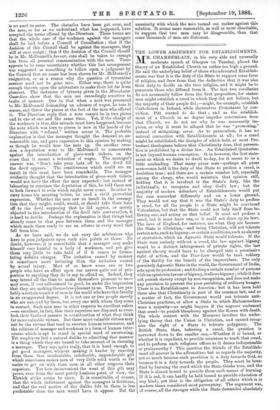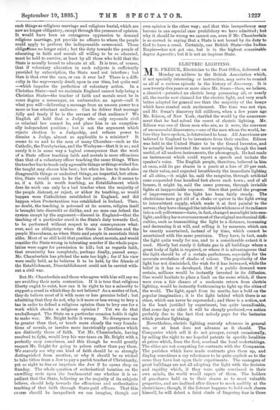THE LOWER ARGUMENT FOR ESTABLISHMENTS.
MR. CHAMBERLAIN, in his very able and unusually moderate speech at Glasgow on Tuesday, placed the theory of an Established Church on rather too high a ground. He said the underlying belief of those who advocated Establish- ments was that it is the duty of the State to support some form of religion, and drew from that the deduction that it was also their duty to decide on the true religion, and it might be to persecute those who differed from it. The last two corollaries do not necessarily follow from the first proposition, for states- men might establish a creed in which they did not believe, but the majority of their people did ;—might, for example, establish Catholicism in Ireland, while themselves Protestants by con- viction. Pitt wanted to do that ; and as the establish- ment of a Church in no degree impedes conversions from that Church, we do not see why he was necessarily im- pious, or why it must be alleged that he was "promoting," instead of mitigating, error. As to persecution, it has no natural connection with Establishments at all ; for a creed might be established, the disciples of which held, as most Pro- testant theologians believe that Christianity does, that persecu- tion is prohibited by a divine law. An Established Quakerism is not beyond human conception. It is, however, the first state- ment on which we desire to dwell to-day, for it seems to us a little misleading. That many pious men—perhaps all pions men—once held it the duty of the State to profess a creed, is doubtless true; and there are a certain number left, especially among the clergy, who would maintain that opinion still, holding that it is involved in the State's duty, like the individual's, to recognise and obey God's law ; but the majority of modern defenders of Establishments would put the case somewhat differently and on a lower ground. They would not say that it was the State's duty to profess a creed, for all the people in a State might be convinced Voluntaries, but that the State could not help itself from be- lieving one, and acting on that belief. It need not profess a creed, but it must have one, or it could not draw up its laws. The laws of England, for instance, are what they are because the State is Christian,—and being Christian, will not tolerate certain acts, such as bigamy; or certain conditions, such as slavery or starvation, which an Agnostic State would tolerate. If the State were entirely without a creed, the law against bigamy would be a distinct infringement of private rights, the law against slavery would have to be changed into a permissive right of action, and the Poor-Law would be rank robbery of the thrifty for the benefit of the improvident. The only genuinely Agnostic State in the world, the Government of India, acts upon its profession ; and finding a certain number of persons with an opinionin favour of bigamy, it allows bigamy; while it does not punish slavery except by non-recognition, and does not make any provision to prevent the poor perishing of ordinary hanger. There is no Establishment in America ; but it has been held there also that Christianity is part of the common law, and as a matter of fact, the Government would not tolerate anti- Christian practices, or allow a State in which Mahommedans were a majority—as might happen if the negroes embraced that creed—to punish blasphemy against the Koran with death. The whole contest with the Mormons involves the under- lying theory that the Union is Christian, and cannot recog- nise the right of a State to tolerate polygamy. The British State, then, believing a creed, the question is narrowed down to the smaller one,—Whether it is bound, or whether it is expedient, to provide ministers to teach that creed, and to perform such religious offices as it deems indispensable or praiseworthy P This question the friends of the Establish- ment all answer in the affirmative; but as regards the majority, not so much because such provision is a duty towards God, as because it is a duty towards the people. They must be bene- fited by learning the creed which the State thinks true, and the State is almost bound to provide them such means of learning. If it is not, it can hardly be held bound to provide education of any kind ; yet that is the obligation of all others which is in modern times considered most peremptory. The argument was, of course, all the stronger while the State demanded absolutely
saoh things as religious marriage and religious burial, which are now no longer obligatory, except through the pressure of opinion. It would have been an outrageous oppression to demand religious marriage, yet provide no officers to whom the people could apply to perform the indispensable ceremonial. Those obligations no longer exist ; but the duty towards the people of educating in faith and morals all willing to be so educated, must be held to survive, at least by all those who hold that the State is morally bound to educate at all. It is true, of course, that if voluntary education in such subjects is sufficiently provided by subscription, the State need not interfere ; but then is that ever the case, or can it ever be ? There is a diffi- culty in the way—rarely dwelt upon in our time, but quite real —which impedes the perfection of voluntary action. In a Christian State—and we maintain England cannot help being a Christian State—the teacher of faith and morals must be in some degree a messenger, an ambassador, an agent—call it what you will—delivering a message from an unseen power to a more or less reluctant audience. Can he deliver that message fully and freely if he is the servant of that audience? We English all hold that a Judge who only expounds civil or criminal law cannot be, and place him in an exception- ally independent position ; but is not the argument which rejects election to a Judgeship, and refuses power to dismiss a Judge, almost as applicable to a minister? It seems to us and to the men of many Churches—such as the Catholic, the Presbyterian, and the Weslevan—that it is so ; and surely it is in some way a logical consequence that the work of a State officer teaching faith and morals is more efficacious than that of a voluntary officer teaching the same things. When the teacher has to teach only agreeable things or things wished for, the taught may choose him best ; but when he has to teach also disagreeable things or undesired things, an impartial, but atten- tive, State would seem to be the best patron. As it seems to us, if a faith is worth teaching, an Establishment which does its work can only be a bad teacher when the majority of the people distrust, or reject, or abhor its teaching, as would happen were Catholicism established in England, and did happen when Protestantism was established in Ireland. Then, no doubt, the teaching is poisoned at its source, religion itself is brought into discredit or dislike, and no man can defend the system except by the argument—disused in England—that the teaching of a particular creed is the State's duty towards God, to be performed without respect to any consequences what- ever, and as obligatory when the State is Christian and the people Mussulman, as when State and people in essentials think alike. Most of us still hold that position about morals, and would consider the State wrong in tolerating murder if the whole popu- lation were eager for permission to kill; but as regards faith, that unanimity has completely, perhaps finally, passed away. Mr. Chamberlain has pitched the note too high ; for if his view were really held, as he believes it to be held, by the friends of the Establishment, Disestablishment could not be carried with- out a civil war.
But Mr. Chamberlain and those who agree with him will say we are avoiding their main contention. If it is true that religious liberty ought to exist, how can it be right to tax a minority to support a creed in which they do not believe ? As a matter of fact, they do believe most of it with more or less genuine belief ; but admitting that they do not, why is it more or less wrong to levy a tax in order to defend a religions opinion than to levy one for a work which shocks a religious opinion ? Yet we do that unchallenged. The State on a particular occasion holds it right to make war. Mr. Bright holds it wrong. No divergence can be greater than that, or touch more closely the very founda- tions of morals, or involve more inextricably questions which are distinctly those of faith. Yet Mr. Chamberlain, having resolved to fight, would levy his war-taxes on Mr. Bright with a perfectly easy conscience, and this though he would greatly respect Mr. Bright for going to prison rather than pay them. We scarcely see why one kind of faith should be so strongly distinguished from another, or why it should be so wicked to take tithes from a Jew to pay a parish teacher of Christianity, yet so right to fine or imprison the Jew if he opens shop on Sunday. The whole question of ecclesiastical taxation on the unwilling rests upon the fundamental one whether it is ex- pedient that the State, believing as the majority of its subjects believe, should help towards the efficacious and authoritative teaching of that faith through State-paid officers. That this coarse should be inexpedient we can imagine, though our
own opinion is the other way ; and that this inexpediency may become in one especial case prohibitory we have admitted; but why it should be wrong we cannot see, even if Mr. Chamberlain is so correct in saying that a State is not bound by its duty to God to have a creed. Certainly, one British State—the Indian Empire—has not got one, but is in the highest conceivable degree Agnostic ; but it is not an impious State.



































 Previous page
Previous page